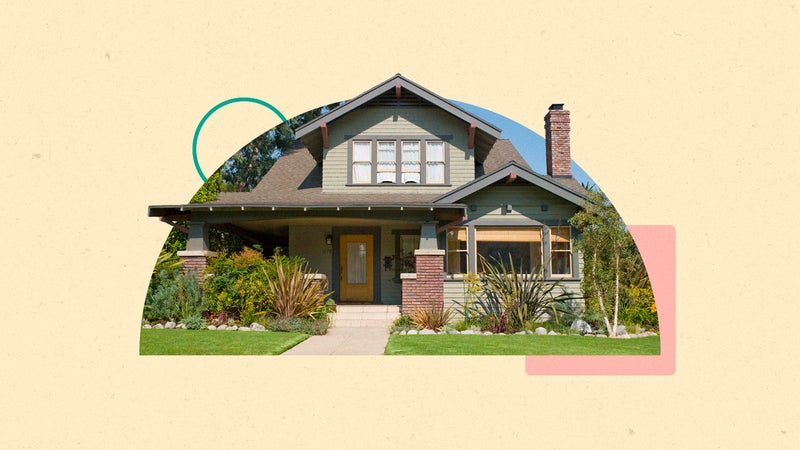Closing costs: What are they and how much are they?

The Bankrate promise
At Bankrate we strive to help you make smarter financial decisions. While we adhere to strict , this post may contain references to products from our partners. Here's an explanation for .
Key takeaways
- Mortgage closing costs are the fees associated with buying a home that you must pay on closing day.
- Closing costs typically range from 2 to 5 percent of the total loan amount, and they include fees for the appraisal, title insurance and origination and underwriting of the loan.
- You may be able to negotiate your closing costs depending on seller concessions.
Many costs come with buying a house, but some of the most substantial to prepare for are the mortgage closing costs. These are due on closing day. Here, we’ll cover what’s included in closing costs and how much they cost.
What are closing costs?
The closing costs for a mortgage include all of the expenses related to applying for the loan and finalizing a real estate sale. Some of the costs are related to the property, while others are related to the mortgage lender’s services and the paperwork involved in the transaction.
With home sales, both buyers and sellers typically pay closing costs. The closing costs paid by sellers are typically deducted directly from the sale proceeds. Buyers usually pay their portion out of pocket.
How much are closing costs?
Mortgage closing costs typically run about 2 to 5 percent of your total loan amount.
The total tab for your closing costs depends on three key factors:
- The price of the home
- The home’s location
- Whether you’re buying or refinancing
For 2021, the average closing costs for buying a single-family home were $6,905, according to the latest study from real estate data firm ClosingCorp. The average closing costs for a refinance came in at $2,375.
However, those costs vary widely across the country partly due to tax differences. For example, homebuyers in Washington, D.C. paid the highest average closing costs, at $29,888. Delaware and New York came in second and third, respectively, with average closing costs of more than $16,000. The cheapest closing costs were found in the middle of the country: Missouri ($2,061), Indiana ($2,200) and North Dakota ($2,501).
What is included in closing costs?
Whether paid by the homebuyer or seller, here’s a list of what is included in closing costs:
- Application fee
- Credit check fee
- Origination fee
- Underwriting fee
- Appraisal fee
- Property survey fee
- Title search fee
- Title insurance policy
- Attorney fee
- Discount points
- Prepaid homeowners insurance premiums, mortgage insurance premiums, property taxes and/or homeowners association (HOA) fees
- Per-diem interest
- Real estate agent commissions
- Transfer tax
- Recording fee
Who pays closing costs?
The buyer pays most closing costs, but the seller pays some, such as the real estate agent’s commissions. As the buyer, you might try to negotiate some of your costs into the current homeowner’s corner, but that’s only feasible if the seller doesn’t have other offers on the table.
Closing costs paid by the buyer
- Appraisal fee: This fee covers the work a licensed appraiser does to determine what the home is worth. The average appraisal fee for a single-family home is between $300 and $425, according to HomeAdvisor. While this is considered a “closing” cost, you typically pay it well before closing day.
- Title search: Unless you’re buying a brand-new home, your lender will have a title company search property records to ensure there aren’t any issues with the title of the home, such as a tax lien. The fee for a title search is around $300.
- Title insurance: Lenders require borrowers to obtain title insurance in case there are issues with ownership after the sale. This policy protects the lender, and the cost is usually 0.50 percent to 1 percent of the amount of the mortgage.
- Origination fee: Lenders can charge an origination fee for creating the loan, which is generally equal to 0.5 percent to 1 percent or more of the amount you’re borrowing.
- Underwriting fee: This fee covers the cost of evaluating and verifying your financial qualifications and eligibility. The underwriting fee might be a flat fee or a percentage of the loan, such as 0.5 percent of the amount you’re borrowing.
- Points: To lower the interest rate on your mortgage, you might also opt to pay mortgage points or discount points. You’ll usually pay 1 percent of the loan principal for one point off the interest rate, which is often equal to a 0.25 percent rate reduction.
- Home inspection: Even if an inspection isn’t required, it’s wise to get one to help uncover any issues with the home before you buy it.
- Attorney fees: There may be a fee for the mortgage closing attorney cost.
Closing costs paid by the seller
- Realtor commissions: The seller is usually responsible for covering the real estate agent commissions, both for the agent representing the buyer and the agent representing the seller. If you’re a seller, you might be able to negotiate a split with the buyer, but that’s rare.
- Transfer tax: Many states impose a transfer tax when real estate changes hands. Often, the seller pays this tax, but in some places, it’s shared by the buyer too.
- Other fees: Sellers also pay some of the same fees buyers do, such as an attorney’s fee and prorated property taxes.
Seller concessions
Sometimes, sellers will agree to pay a portion of your costs to help with the sale. This is known as seller concessions. It may also involve the seller lowering the purchase price to account for things like repairs.
However, there are limits on the amount of seller concessions you can receive, depending on your loan. Conventional loans are only eligible for up to 9 percent of the purchase price or appraised value, whichever is lower. FHA loans and USDA loans allow for up to 6 percent, while VA loans have a maximum of 4 percent total. Jumbo loans vary based on the lender.
How to lower your closing costs
While you can’t avoid paying all mortgage closing costs, there are some that can be negotiated, potentially saving you money. Here are a few tips:
- Look for lenders that offer discounts: Consider working with a mortgage lender that doesn’t charge an origination fee, or that’ll offer you a discount. If you’re getting your mortgage at your bank, you can also try asking for a discount or fee waiver, since you’re already a customer.
- Apply for down payment assistance: Particularly if you’re a first-time homebuyer, explore down payment assistance and grants that can help you cover closing costs.
- Use a no-closing-cost loan: Look into a no-closing-cost mortgage — but don’t let the name fool you. You’ll still “pay” the closing costs by financing them with the mortgage (and paying interest on them) or paying a slightly higher interest rate.
FAQ about closing costs
-
Before you start looking at homes, get preapproved for a mortgage so you understand how much home you can afford. That’ll give you a rough sense of how much the closing costs might be.
-
Sometimes. Many lenders offer no-closing-cost mortgages, meaning you won’t pay the closing costs upfront on closing day. Instead, they’re rolled into the overall loan balance — increasing the principal — or the lender charges a higher interest rate on the loan.
-
The majority of closing costs are paid when you sign your final loan and purchase documents at closing. You’ll pay some of the fees, such as for an appraisal and credit check, ahead of time.
-
It depends on the loan type, your lender and how fast you send over the documentation they need to process and underwrite your application. As of March 2024, it took the average borrower 44 days to close a mortgage, according to ICE Mortgage Technology. Conventional loans tend to have faster closing times than government-backed products, like FHA and VA loans. New purchase loans tend to take slightly less time than refinances.



